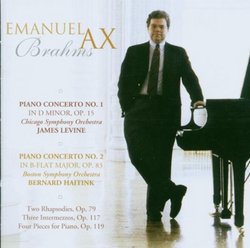An Intimate Conversation Between Brahms and Ax
Grady Harp | Los Angeles, CA United States | 06/09/2007
(5 out of 5 stars)
"The two CD album recently released by Sony is a gathering of some of the finest moments Emanuel Ax has recorded of the music of his beloved Johannes Brahms. Long respected for his intelligence, self-effacing performances where it is clear that the genius of the moment is the composer not the pianist, and his close partnership with the likes of Yo-Yo Ma and others in chamber recitals, Emanuel Ax is in many ways a musician's musician. Not only is he technically brilliant as a pianist, he is also a poet at the keyboard. For this special release Ax offers the program notes, words that reflect his sincerity and vision of the music Brahms.
The first CD opens with a grand Piano Concerto No. 1 in D Minor recorded with the Chicago Symphony under the direction of James Levine in 1983. It is approached in the grand Romantic style with Levine providing muscular support form the orchestra and yet allowing the mysticism of the Adagio to be the magic of Ax's controlled passion. The second CD features a 1997 recording of the Piano Concerto No. 2 in B-flat Major with Bernard Haitink collaborating with the Boston Symphony Orchestra: the majesty and elegance of Ax's approach reminds this listener of the treasured performance by Rudolf Serkin of many years ago. It is an exquisitely understated yet richly robust recording.
The 'fillers' for these discs are works for solo piano written by Brahms out of his devotion to pianist Clara Schumann and the works reflect that thwarted romance. Especially successful are the Three Intermezzos Op.117, but the Rhapsodies Op. 79 and the Four Pieces for Piano Op. 119 are as sensitively performed as any other artist's on recording. This is a superb collection of Brahms' piano works, with performances of the concerti as fine as any available. Highly Recommended. Grady Harp, June 07"
Strong Brahms playing, if a bit faceless
Santa Fe Listener | Santa Fe, NM USA | 02/05/2007
(4 out of 5 stars)
"I must admit a bias at the outset: to me, Emanuel Ax has become a proficient, faceless pianist whose playing long ago lost its individuality. That doesn't mean, however, that he is anything less than an accomplished musician, or that his musical taste is ever in question. In fact, this 2-CD Brahms colllection, bringing together his recordings of the two piano concertos and some solo works, might be better if it weren't in such good taste. There's plenty o9f virtuosity, plus a real feeling for Brahms, but I miss any individual signature.
Of the two concertos, the D major offers real excitment in the first and last movements, largely becasue James Levine is determined to make something out of the orchestral part, which he lights into with a vengeance. Brahms was frequently guilty of thickening his orchestrations, yet here they sound leaner, and Levine's faster-than-usual tempos work well. Ax plays with depth and sonority in these movements, his expression entirely direct. The piano is left to itself in much of the Adagio, however, and her he becomes faceless and generic.
Concerto #2 is altogether tamer, thanks to Bernard Hiatink. Using the elegant Boston Sym. instead of the powerhouse Chicago Sym. in the First Concerto also makes a difference. Again Ax is never less than exemplary, but the great opening movement in particular lacks fire, and the problematic finale becomes somewhat tinkly and trivial-sounding, always a danger in this movement. Still, the original release got good reviews, and Sony provides excellent high-definition sound.
The Op. 117 and 199 Intermezzi come from a third album Ax made, one of his best, actually. He gives these moody little pieces the benefit of a warm, sympathetic interpretation without swooning or sentimentality. I don't mean to sound like a broken record, but even here his pianism is too generic to be called great. Indeed, ntohing here is great, which is a shame given that Ax had the potential for greatness."


